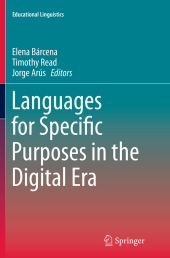 Neuerscheinungen 2016Stand: 2020-02-01 |
Schnellsuche
ISBN/Stichwort/Autor
|
Herderstraße 10
10625 Berlin
Tel.: 030 315 714 16
Fax 030 315 714 14
info@buchspektrum.de |

Jorge Arus, Elena Bárcena, Timothy Read
(Beteiligte)
Languages for Specific Purposes in the Digital Era
Herausgegeben von Bárcena, Elena; Read, Timothy; Arus, Jorge
Softcover reprint of the original 1st ed. 2014. 2016. xvii, 348 S. 14 SW-Abb., 86 Farbabb. 235 mm
Verlag/Jahr: SPRINGER, BERLIN; SPRINGER INTERNATIONAL PUBLISHING 2016
ISBN: 3-319-37850-3 (3319378503)
Neue ISBN: 978-3-319-37850-3 (9783319378503)
Preis und Lieferzeit: Bitte klicken
This book features the work of leading researchers who review state-of-the-art developments in computer-assisted language learning. It includes case studies as well as theoretical analysis of the links between CALL and natural language processing.
Explores the direct relation of modern CALL (Computer-Assisted Language Learning) to aspects of natural language processing for theoretical and practical applications, and worldwide demand for formal language education and training that focuses on restricted or specialized professional domains. Unique in its broad-based, state-of-the-art, coverage of current knowledge and research in the interrelated fields of computer-based learning and teaching and processing of specialized linguistic domains. The articles in this book offer insights on or analyses of the current state and future directions of many recent key concepts regarding the application of computers to natural languages, such as: authenticity, personalization, normalization, evaluation. Other articles present fundamental research on major techniques, strategies and methodologies that are currently the focus of international language research projects, both of a theoretical and an applied nature.
Preface by Elena Bárcena, Timothy Read and Jorge Arús.- Section 1: General issues about learning languages with computers. Information Technology and Languages for Specific Purposes in the EHEA: Options and Challenges for the knowledge society by Elisabet Arnó-Macià. Fostering Learner Autonomy in Technology-Enhanced ESP Courses by Ana Gimeno Sanz. A blended learning proposal for professional English integrating Moodle with classroom work for the practice of oral skills by Elena Martín-Monje, Noa Talavá. Student Assessment in the Online Language Learning Materials developed and delivered through the ingenio system by Ana Sevilla Pavón, Antonio Martínez Sáez,José Macario De Siqueira.- Section 2: Computer-assisted experiences for the development of language competences and skills. Internet Dictionaries for Teaching and Learning Business English in Spanish Universities by Pedro A. Fuertes-Olivera. Moodle Glossary Tasks for Teaching Legal English by Ruth Breeze. Promoting Specialised Vocabulary Learning through Computer-Assisted Instruction by M¦ Dolores Perea-Barberá, Ana Bocanegra-Valle. A Practical Application of Wikis for Learning Business English as Second Language by Pilar Rodríguez Arancón.- Section 3: Corpus-based approaches to/ applications for teaching and processing languages. A Genre-Based Approach to the Teaching of Legal and Business English: the GENTT Specialized Corpus in the LSP Classroom by Anabel Borja Albi, Natividad Juste Vidal, M¦ del Pilar Ordó¤ez, Tomás Conde. Innovative methods for LSP-teaching: how we use corpora to teach business Russian by James Wilson, Serge Sharoff, Paul Stephenson, Anthony Hartley. Automatic specialized vs. non-specialized text differentiation: the usability of grammatical features in a Latin multilingual context by M.Teresa Cabre, Irid da Cunha, Eric SanJuan, Juan-Manuel Torres Moreno, Jorge Vivaldi. Exploring the Potential of Corpus Use in Translation Training: New Approaches for Incorporating Software in Danish Translation Course Design by Anne Lise Laursen.- Section 4: Processing natural languages. Representing environmental knowledge in EcoLexicon by Pamela Faber, Pilar León Araúz, Arianne Reimerink. New approaches to audiovisual translation: the usefulness of corpus-based studies for the teaching of dubbing and subtitling by Juan Pedro Rica Peramingo, Reyes Albarrán Martín, Blanca García Riaza. The pragmatic level of OntoLingAnnot´s ontologies and their use in pragmatic annotation for language teaching by Antonio Pareja Lora. Reflections on the future of technology-mediated LSP research and education by Jorge Arús, Elena Bárcena, Timothy Read


